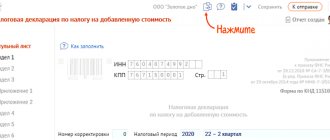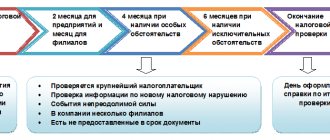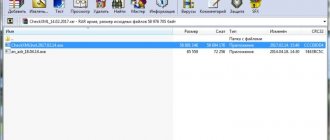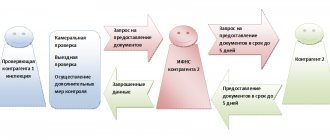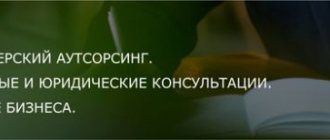Try the online service Kontur.Accounting!
- Quick establishment of primary
- Automatic payroll calculation
- Convenient online reporting
- Multiplayer mode
- Available technical support 24/7
A month is free!
As soon as you become an employer, prepare for inspections by the Russian Pension Fund (PFR) and the Social Insurance Fund (FSS). First of all, they check the reporting to see whether it matches the benchmark indicators. It also checks whether you apply incentives, special reduced rates and whether you reimburse funds from fund budgets.
Let's take a closer look at the essence of these checks and the funds' requirements for employers. We will tell you separately about desk inspections, and separately about on-site inspections.
Scheduled and unscheduled inspections of the Social Insurance Fund
Scheduled inspections are so called because they must be carried out in accordance with the inspection schedule, i.e. be planned in advance. The schedule must be approved by order of the head of the territorial body of the fund. Moreover, such events should be carried out no more than once a year and at least once every 3 years in relation to one person.
The need to conduct unscheduled inspections arises if, for example, a complaint or appeal is received from a citizen, legal entity or individual entrepreneur. In order to verify the arguments of the complaint (appeal), it is necessary to carry out control measures, and since such a procedure was not planned, that is why it is called unscheduled.
USEFUL : even more on the issue of scheduled inspections via the link on our website
Checking sick leave
Sick leave certificates are checked by FSS employees with special care, since they are the only confirmation that the employee needs to be paid benefits. The sheets are checked both during desk and on-site inspections. What exactly does the FSS check on sick leave:
- Does the sick leave form comply with State Standards and is it not a fake?
- Availability of the doctor's seal and signature on the sick leave (they must be clear and legible);
- Correct filling (all information about both the employee and the organization must be clearly filled out). If there are errors on the sick leave, they must be certified in the required manner.
Important! The FSS checks not only whether the employer filled out the sick leave correctly, but also how the medical institution filled it out. Errors in the employee's full name or employer's name are not allowed.
Procedure for on-site inspection of the social insurance fund
To find out in what order an on-site inspection of the FSS is carried out, let us turn to Art. 26.16-26.19 of the Law of July 24, 1998 No. 125-FZ.
An on-site inspection is carried out on the territory of the policyholder based on the decision of the head of the territorial body. In exceptional cases, if the policyholder is unable to provide premises for the inspection, then it can be carried out at the location of the Social Insurance Fund.
During the visit, it is verified that insurance premiums have been calculated correctly and paid on time, as well as that expenses for payment of insurance coverage have been made legally.
The period for which a visit to an individual entrepreneur or organization is carried out cannot be more than 3 years. On-site inspections should be carried out no more than once every 3 years. The duration of the procedure should not exceed 2 months. In some cases, the period can be extended to 4 or 6 months.
The immediate procedure for conducting an on-site inspection of the FSS is as follows:
- a decision is made by the head of the Social Insurance Fund to conduct an audit
- visiting persons of the social insurance fund conducting an inspection, in order to gain access to the premises of the policyholder, are required to present official identification and a decision to conduct supervision
- During the process, officials have the right to request the necessary documents from the policyholder
- after the inspection, a certificate is drawn up and within 2 months a report of the control results must be drawn up, which must be handed over to the policyholder within 5 working days
- After receiving the act, the policyholder, if he disagrees with it, has the right to submit objections within 15 working days
USEFUL : watch the video to understand in more detail the line of defense during a tax audit or any other - call our lawyer right now
How to submit documents at the request of the FSS of Russia
Documents can be submitted both on paper and electronically. Paper copies must be certified. To do this, you need to put the inscription “Correct” on them, indicate the position of the person who certified the copy, his personal signature and transcript of the signature (initials and surname), put the date of certification and the seal of the organization. This procedure is provided for in paragraph 3.26 of GOST R 6.30-2003, approved by Decree of the State Standard of Russia dated March 3, 2003 No. 65-st.
Each copy of the document must be certified. Binders consisting of copies of several documents cannot be certified.
Documents that were requested during the inspection must be submitted within 10 working days from the date of delivery of the relevant request (Clause 4, Part 2, Article 28, Part 5, Article 37 of the Law of July 24, 2009 No. 212-FZ) .
Attention: if you do not submit documents at the request of inspectors within 10 working days, the organization or entrepreneur will be fined 200 rubles. for each unsubmitted document (Article 48 of the Law of July 24, 2009 No. 212-FZ). And the responsible employee of the organization, in particular its head, faces a monetary penalty in the amount of 300 to 500 rubles. (Part 3 of Article 15.33 of the Code of Administrative Offenses of the Russian Federation).
How is the FSS desk audit carried out?
A desk inspection, unlike an on-site inspection, is carried out at the location of the FSS. This procedure is carried out on the basis of calculations regarding the accrual and payment of insurance premiums and documents provided by the policyholder.
A desk audit is carried out by FSS officials, and no special decision is required to carry out such an event.
The inspection is carried out within 3 months from the day the policyholder provided the calculation:
- If the analysis reveals violations, errors, or inaccuracies, the policyholder will be given the opportunity to provide explanations or make corrections.
- if, after reviewing the explanations and documents, the person conducting the procedure establishes that an offense has been committed, then an act must be drawn up.
If the results of the inspection do not reveal any violations and everything is fine, then no report is drawn up and the policyholder is not notified of the results of the inspection.
What does the FSS check?
There are several reasons to check. FSS employees can check taxpayers for the correctness of:
- accruals and transfers of contributions;
- spending funds accrued by policyholders for insured events (sick leave, maternity leave, parental leave);
- obtaining vouchers;
- spending funds on cases of injuries at work.
The check begins with calculating the correctness of filling out reports in form 4-fss and 4a-fss. Since previous periods are taken into account when calculating benefit amounts, contributors are required to keep all documentation of expenses for at least five years.
On the FSS website, each employer has the opportunity to check reports before submitting them to the funds under a special FSS verification program. Using this program, the completion of all calculation tables, base amounts, accruals and payment of contributions is checked. Calculations are made on an accrual basis for reimbursable expenses.
What documents can the FSS request during an inspection?
During the inspection, FSS officials have the right to request documents that are related to the subject of control.
Thus, when inspectors request any documents, it is necessary to check whether these documents are relevant to a particular situation. If the documents do not relate to the subject of the raid, it is accordingly necessary to answer that the inspectors are requesting documents that are not within the scope.
It is necessary to be attentive and careful when refusing to provide documents to inspectors, since a person may be held accountable for refusing to provide documents.
Fines and sanctions when violations are detected
Taxpayers whose accounting records are found to have irregularities are held accountable. Failure to submit a calculation in a timely manner will entail the imposition of sanctions in the amount of 5% of the amount accrued for payment under the calculation for each full and partial month. Evasion from submitting a calculation in electronic form entails a fine of 200 rubles.
Late payment of contributions resulting from an understatement of the tax base entails the payment of sanctions in the amount of 20% (40% if intentional) of the amount of the unpaid contribution. If an enterprise avoids submitting documents for inspection, a fine of 200 rubles is imposed for each document not submitted. An additional disadvantage may be additional accrual based on an analogue - data from an enterprise that has approximate performance indicators.
Starting from 2015, the Foundation may conduct repeated inspections. If violations are discovered that were not identified during the initial audit, no sanctions are imposed on the taxpayer.
Appealing the FSS inspection report
FSS inspection reports can be appealed to a higher authority or to court.
In this case, the complaint can be filed simultaneously both with the insurer’s superior body and with the court.
A complaint to a higher authority is submitted directly to this authority in writing or in the form of an electronic document. A complaint can be filed within 3 months from the day the person learned of a violation of his rights; this will be considered the day the act was received. The decision on the complaint must be made within 1 month and the person must be notified about it within 3 working days.
When appealing an act in court, it is necessary to prepare and submit an application to the court according to the rules established by the Arbitration Procedure Code of the Russian Federation. If the application is submitted by individuals (not individual entrepreneurs), then it is subject to consideration by a court of general jurisdiction. The act is appealed to a court of general jurisdiction according to the rules of the CAS of the Russian Federation. The period for appeal is 3 months.
ADVICE : despite the fact that the period for appeal is 3 months, you should not wait until the last minute and not file a complaint. Since a complaint can be filed directly to a higher authority and to the court, one should take advantage of this opportunity and file a complaint, so to speak, to both authorities. If deadlines allow, you can first file with a higher authority and then go to court.
USEFUL : read more about challenging the FSS fine using the link on the website
Prerequisites for inspection
Taxpayers who regularly submit reports, pay contributions on time and make moderate expenses are rarely subject to inspection by the Social Insurance Fund. Companies are subject to inspection in the following cases:
- The presence of a significant number of errors in reporting and violations that contradict the law.
- Submitting reports that missed deadlines.
- Systematic excess of expenditure indicators over assessed contributions.
- Regular receipt of significant amounts from the budget to cover expenses allocated for social needs. Reimbursement is made if there are insufficient own funds to cover social insurance expenses.
The absolute basis for conducting a desk audit is the submission by the taxpayer of a calculation with an application for reimbursement of expenses.
How to win a lawsuit with the Social Security Fund?
To win a lawsuit with the FSS, you must first answer several questions, namely:
- whether violations were committed by the FSS during the inspection
- Is there evidence to refute the inspectors’ conclusions about the presence of violations?
If the answer to these questions is positive, all that remains is to prepare a reasoned statement to the court with references to evidence and rules of law, as well as to positive judicial practice, if any.
If you are not 100% sure that you are right, but also not sure that the FSS is right, you should try to sue this body.
Alternatively, in order to win a lawsuit with this executive authority, when you are not entirely confident in your abilities, you should contact a lawyer who specializes in this category of disputes and who knows what to look for in a dispute.
Grounds and reasons for including an enterprise in the inspection plan
All organizations and individual entrepreneurs that have employees are subject to fund inspections. The inspection plan primarily includes enterprises that have the following indicators:
- Discrepancy between the tax base data for the periods specified in the calculations submitted to the Social Insurance Fund and the Pension Fund of the Russian Federation.
- The presence of errors in accruals and expenses identified as a result of desk audits (see → how to pass a desk audit by the Social Insurance Fund, → how a desk audit of the Pension Fund of Russia is carried out).
- Systematic failure to comply with the reporting schedule.
- The presence of arrears on contributions indicated in the reporting for more than 2 reporting periods.
- Receiving information from the Federal Tax Service about negative audit results or identified tax evasion schemes.
- Reducing the amount of contributions to the budget by period with constant indicators of the wage fund and headcount.
The presence of any of the indicators increases the likelihood of the enterprise being included in the inspection plan. Let's consider an example of a taxpayer experiencing negative indicators. presented tax base data for 4-FSS in the amount of 750 thousand rubles for 9 months of 2015. At the same time, according to the reporting to the Pension Fund of Russia in the RSV-1 form, the amount of 700 thousand rubles is indicated. In addition to the inconsistencies, the company’s accounting department did not transfer contributions for the 2nd quarter of 2015. Based on the results of the analytical analysis, the Bastion LLC enterprise was proposed to be included in the inspection plan for 2021.
FSS lawyer in Yekaterinburg
In our Law Office “Katsailidi and Partners” you will find a lawyer who specializes in disputes of this category, he will be able to:
- advise you on the audit carried out by the fund
- will analyze the documents provided, including the results of the work of the supervisory authority and speak out about possible options for the development of events and prospects for the case
- prepare a reasoned complaint to a higher body of the FSS
- prepare an application to the court to appeal the control results
- will represent the interests of the principal during an inspection, when appealing the results of an inspection, or in another dispute with the FSS in court
In addition to providing the above list of services, our lawyer is ready to provide other legal services that are related to the social insurance fund and other authorities, including requesting documents, appealing court decisions, etc. Call us today!!!
Checking payments on certificates of incapacity for work. Example
The predominant amounts of costs are sent by employers to payments for certificates of incapacity for work. During absence, the employee receives average earnings calculated on the basis of the previous 2 years. When checking compliance with the calculation requirements, the Fund's auditor determines the completeness of the information.
| Indicators to check | Detailing |
| Leaflet details | Availability of a stamp, seal, and signatures of the responsible persons of the medical institution. |
| Correctness of filling | No corrections, complete information |
| Personal and employer details | Availability and compliance of data with documents |
| Validity period of the document | Start, end and renewal dates |
| Employee length of service | The total cumulative period of work, calculated from the work book |
| Calculated payment details | Accuracy of determining average daily earnings and amount payable |
| Application of coefficients | Availability of decreasing (when working with registration at half the rate) and increasing (when working in the Far North) coefficients |
The auditor's control is aimed at confirming:
- Completeness of the details of the certificate of incapacity for work.
- Compliance of all documents by dates - time sheets, dates of sheets.
- The accuracy of determining the average salary and length of service of an employee.
- Accuracy of intermediate calculation data and final amount.
When determining the length of service used for payments for certificates of incapacity for work, the total length of service is taken into account. Let's consider one of the common cases of errors made during calculations.
The enterprise PO Iskra paid disability benefits to employee M., who has a total length of service of less than 6 months. At the time of the onset of illness (opening the sheet), the employee’s length of service was 5 months 20 days. As of the date of closing the sheet, the length of service was 6 months 3 days. The accounting employee of Iskra PA determined the length of service at the time of calculation, which contradicted the date of occurrence of the insured event. The payment was made based on average earnings.
During a desk audit of the FSS maintenance department, the auditor identified a discrepancy in data, which led to pre-tax assessment. Payment to employee M. must be made based on the minimum wage.
Periods
Inspectors traditionally focus on periods of activity of a company or organization, starting from the last visit by auditors. In cases where there have been facts of failure to fulfill their insurance obligations on the part of the policyholder, the period under review may be extended.
The period for monitoring the actions of the policyholder and his documents may depend on the type of regular inspection - one year, one quarter.
In addition, as part of an on-site inspection by auditors from the Social Insurance Fund, control can be carried out for any selected period of the unfinished calendar year.
When conducting a detailed structured audit, the audit commission takes into account the reporting periods during the last three years of the organization's activities. The selection may be made at the discretion of the auditors. The entire three-year period may also be subject to verification.
Results
A desk audit is carried out by tax officials upon receipt of each declaration or calculation. The period for conducting an audit cannot exceed 3 months, and for VAT returns - 2 months (with rare exceptions). The check usually takes place automatically. The system analyzes the declaration based on control ratios. If there are no gaps, then the check ends there. If there is, tax authorities begin a more in-depth study of the information provided.
Sources: Tax Code of the Russian Federation
You can find more complete information on the topic in ConsultantPlus. Free trial access to the system for 2 days.
FSS has come to you...
When inspecting companies and entrepreneurs, the Social Insurance Fund of the Russian Federation (FSS) is guided by the Methodological Recommendations approved by it on December 4, 2003 No. 134 and March 17, 2004 No. 24. The first are devoted to checking the payment of contributions for compulsory insurance against industrial accidents and occupational diseases, and the second – to check the spending of the fund’s money.
Whom does the FSS check?
Fund employees can check any company. Every quarter they draw up an inspection plan. As stated in the Methodological Instructions, first of all, firms that have spent significant sums on paying benefits or have sharply changed the amount of insurance payments while keeping the number of employees unchanged, and, of course, those who often did not submit payroll statements to the fund. In addition, debtors of contributions to the Social Insurance Fund and companies that received comments during a desk audit will have to prepare for an on-site inspection.
